On 18 December French singer Léo Marjane (1912–2016) passed away. Marjane helped to introduce jazz in France, and recorded more than 180 songs between 1932 and mid-1950s. Her popularity reached a peak in the late 1930s and early 1940s. After World War II, her career went into sharp decline. Léo Marjane was 104.
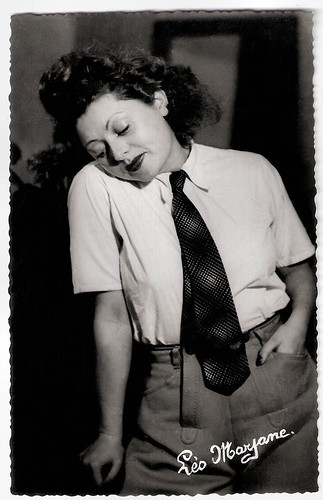
French postcard by P.E.
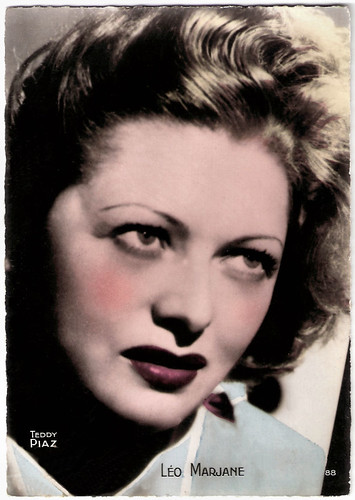
French postcard by Editions O.P., Paris, no. 88. Photo: Teddy Piaz.
Léo Marjane was born Thérèse Maria Léonie Gendebien in Boulogne-sur-Mer, France, in 1912.
Marjane began her career in the early 1930s singing in cabarets in Paris. She was noticed for her warm contralto voice and the clarity of her diction, and in 1936 she was signed to a contract with the Pathé-Marconi label.
Her early recordings – a mixture of original songs and standards of the era such as Begin the Beguine and Night and Day – were well received and popular. Her first hit was La Chapelle au clair de lune.
The peak of Marjane's career came in the early 1940s, when she was regarded as one of France's biggest female singing stars. In 1941, she recorded her signature song, the Charles Trenet-penned Seule ce soir (Alone Tonight), which captured the feelings of the many who were experiencing wartime separation and became one of the best-loved songs of its time.
She also appeared in a few films, including Feu Nicolas/The late Nicolas (Jacques Houssin, 1943), starring Rellys.
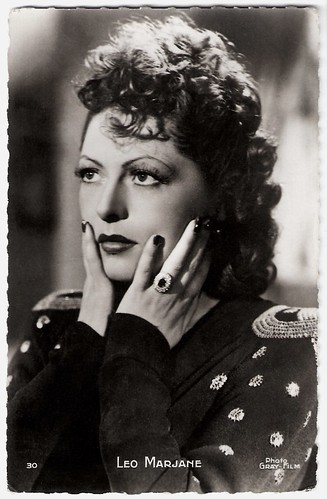
French postcard by Editions P.I., Paris, no. 30. Photo: Gray Film. Publicity still for Feu Nicolas/The late Nicolas (Jacques Houssin, 1943).
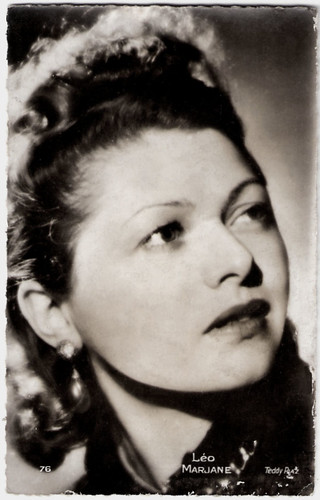
French postcard by Editions O.P., Paris, no. 76. Photo: Teddy Piaz.
Léo Marjane's success came to an abrupt halt following the Liberation of France in August 1944. She was accused of having appeared many times at venues frequented by German officers, and her numerous performances on German- and collaborator-controlled Radio Paris were also held against her.
Marjane maintained that she had been no more than naïve. Nevertheless, in the immediate aftermath of the end of World War II, the allegations and negative publicity in France led her to spend a period of time in Belgium and also in England, where she was largely unknown.
On her return to France Marjane resumed her recording career. Popular opinion had turned against her, however, and she found little further success. Also Marjane's style of music fell increasingly out of fashion as the 1950s progressed, although she continued to record critically praised but poor-selling material until the middle of the decade.
During this period she toured extensively in the United States, Canada and South America, and also had roles in two films: Les deux gamines/The Two Girls (Maurice de Canonge, 1951) in which she co-starred with Suzy Prim, and Jean Renoir's Elena et les hommes/Elena and Her Men (1956), starring Ingrid Bergman. She also appeared in Billy Wilder’s Love in the Afternoon (1957) with Gary Cooper and Audrey Hepburn.
In 1948 she had married to Baron Charles de la Doucette, and in 1961 she decided to abandon show business completely. The couple lived in the village of Barbizon, outside Paris, where they devoted themselves to horse breeding.
Marjane's legacy has been kept alive by devotees of French song. A career retrospective CD, Seule ce soir, was issued in France in 2004. Marjane has consistently shunned most requests for television, radio, or published media interviews. She did, however, give an interview to radio channel France Musique shortly before her 90th birthday in 2002.
Léo Marjane died in Barbizon at 104 years old. She was married twice. Her first husband was Raymond Gerard. With Baron Charles de la Doucette, she had a son, Philippe.
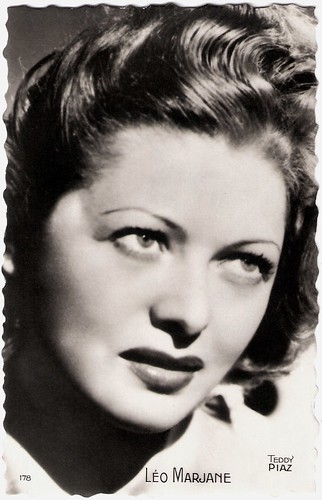
French postcard by O.P., Paris, no. 178. Photo: Teddy Piaz.
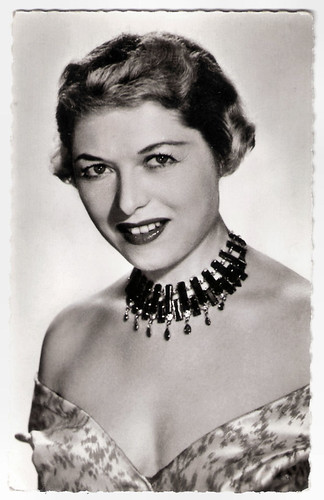
French postcard by Editions P.I., Paris, no. 810. Photo: Sam Lévin.
Sources: Le Monde (French), Wikipedia, and IMDb. With additional information by Ivo Blom and Marlene Pilaete (Thanks!).

French postcard by P.E.

French postcard by Editions O.P., Paris, no. 88. Photo: Teddy Piaz.
Alone Tonight
Léo Marjane was born Thérèse Maria Léonie Gendebien in Boulogne-sur-Mer, France, in 1912.
Marjane began her career in the early 1930s singing in cabarets in Paris. She was noticed for her warm contralto voice and the clarity of her diction, and in 1936 she was signed to a contract with the Pathé-Marconi label.
Her early recordings – a mixture of original songs and standards of the era such as Begin the Beguine and Night and Day – were well received and popular. Her first hit was La Chapelle au clair de lune.
The peak of Marjane's career came in the early 1940s, when she was regarded as one of France's biggest female singing stars. In 1941, she recorded her signature song, the Charles Trenet-penned Seule ce soir (Alone Tonight), which captured the feelings of the many who were experiencing wartime separation and became one of the best-loved songs of its time.
She also appeared in a few films, including Feu Nicolas/The late Nicolas (Jacques Houssin, 1943), starring Rellys.

French postcard by Editions P.I., Paris, no. 30. Photo: Gray Film. Publicity still for Feu Nicolas/The late Nicolas (Jacques Houssin, 1943).

French postcard by Editions O.P., Paris, no. 76. Photo: Teddy Piaz.
Collaborator or no more than naïve?
Léo Marjane's success came to an abrupt halt following the Liberation of France in August 1944. She was accused of having appeared many times at venues frequented by German officers, and her numerous performances on German- and collaborator-controlled Radio Paris were also held against her.
Marjane maintained that she had been no more than naïve. Nevertheless, in the immediate aftermath of the end of World War II, the allegations and negative publicity in France led her to spend a period of time in Belgium and also in England, where she was largely unknown.
On her return to France Marjane resumed her recording career. Popular opinion had turned against her, however, and she found little further success. Also Marjane's style of music fell increasingly out of fashion as the 1950s progressed, although she continued to record critically praised but poor-selling material until the middle of the decade.
During this period she toured extensively in the United States, Canada and South America, and also had roles in two films: Les deux gamines/The Two Girls (Maurice de Canonge, 1951) in which she co-starred with Suzy Prim, and Jean Renoir's Elena et les hommes/Elena and Her Men (1956), starring Ingrid Bergman. She also appeared in Billy Wilder’s Love in the Afternoon (1957) with Gary Cooper and Audrey Hepburn.
In 1948 she had married to Baron Charles de la Doucette, and in 1961 she decided to abandon show business completely. The couple lived in the village of Barbizon, outside Paris, where they devoted themselves to horse breeding.
Marjane's legacy has been kept alive by devotees of French song. A career retrospective CD, Seule ce soir, was issued in France in 2004. Marjane has consistently shunned most requests for television, radio, or published media interviews. She did, however, give an interview to radio channel France Musique shortly before her 90th birthday in 2002.
Léo Marjane died in Barbizon at 104 years old. She was married twice. Her first husband was Raymond Gerard. With Baron Charles de la Doucette, she had a son, Philippe.

French postcard by O.P., Paris, no. 178. Photo: Teddy Piaz.

French postcard by Editions P.I., Paris, no. 810. Photo: Sam Lévin.
Sources: Le Monde (French), Wikipedia, and IMDb. With additional information by Ivo Blom and Marlene Pilaete (Thanks!).
No comments:
Post a Comment